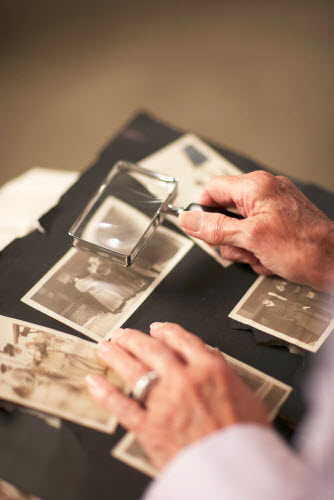 As a caregiver, you may be caring for someone who is unable to recall what he had for lunch earlier today, yet they may well be able to recount events from long ago. Not only is the act of reminiscing a valuable part of adding to your collection of cherished family stories, but it can also help you strengthen your connection while keeping your loved one's mind active. Here are five simple ways for caregivers and those they are caring for to take a walk down memory lane.
As a caregiver, you may be caring for someone who is unable to recall what he had for lunch earlier today, yet they may well be able to recount events from long ago. Not only is the act of reminiscing a valuable part of adding to your collection of cherished family stories, but it can also help you strengthen your connection while keeping your loved one's mind active. Here are five simple ways for caregivers and those they are caring for to take a walk down memory lane.
1. Get Out the Scrapbook
Who doesn't love looking at old pictures? While they may make you misty-eyed, they're a valuable way to revisit cherished people and places. From old family snapshots to newspaper clippings, photos and scrapbooks are treasure troves of precious memories waiting to be discovered.
2. Use Your Senses
Remember the taste of your grandmother's secret recipe chocolate chip cookies? Or the smell of your great-uncles tweed suits? If so, your aging loved one probably does too. Think back to some of the most memorable, evocative smells and tastes of your childhood. From your grandfather's cologne to your aunt's favorite flower, these sensory triggers can bring back long-forgotten memories in mere seconds.
3. Hit the Road
If the person you care for is mobile, consider taking a scenic driving tour of his/her hometown or favorite local areas. While mobility may be a challenge, it's worth the trip: these may be places he never thought he'd see again.
Asking questions as you go can help draw out memories. Open-ended questions and general comments typically elicit the best results without making your loved one feel threatened or pressured.
4. Music

While your loved one may no longer be able to hold a conversation or express himself with words, music can often trigger an emotional response. If your loved one has a favorite song or musical genre, sit down and listen together. The right piece of music can do everything from facilitate cognitive function to switch a mood from bad to good. You may be surprised to find him or her singing along! Music has been scientifically proven to be a powerful device for seniors, and even more so for people with Alzheimer's disease or dementia.
Keep in mind that each person's response to a piece of music is linked to prior experiences. If a song causes your loved one to become sad or agitated, switch to something else.
5. Screen Time
Many people recall trips to the movies as a rare, special event. A movie can elicit memories of prior viewings, while making a new memory at the same time.
If you can't get to the local cinema, consider watching one of your loved one's favorite television shows together. Tracking them down is easier than ever thanks to streaming sites like Netflix and Hulu.
Research has linked the ability to look back in life -- at both the highs and the lows -- with enhanced satisfaction in the golden years. Meanwhile, care givers also derive essential benefits: reminiscing with aging loved ones has been shown to decrease stress. If you found this article helpful, please share it with a friend who might benefit from this useful information. And be sure to check out our caregiver videos.
mmlearn.org offers a large library of free videos for caregivers of older adults, covering topics pertaining to senior care. Whether you are a healthcare professional or a family caregiver, if you are caring for an older adult we know that you will find mmlearn.org an essential learning and guidance tool for all of your caregiver training needs.

